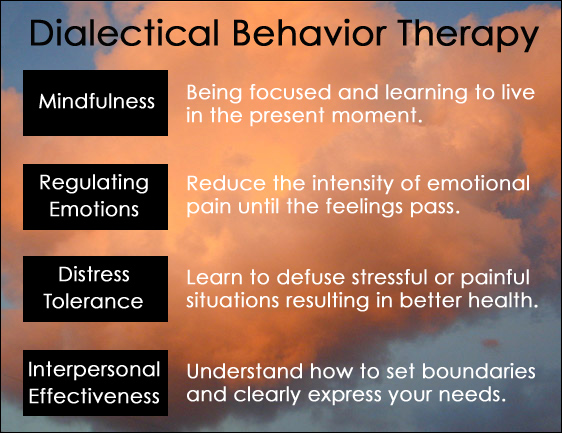What is Dialectical Behavior Therapy?
Dialectical Behavioral Therapy (DBT) is a sub-type of Cognitive Behavioral Therapy (CBT) that teaches patients to successfully regulate their emotions and gain control of their reactions to stimuli. Therapists set specific goals for their clients, but some common themes include:
The Dialectical Behavior Therapy Skills Card Deck offers prompts to the many essential components of DBT that increase effective coping behaviors, such as self-compassion, assertiveness, prompting a values-based life, and increasing effective problem-solving skills.

- Improving interpersonal relationships
- Calming emotional turbulence
- Increasing mindfulness
- Tolerate upsetting situations and stress with more ease
Some patients need help with all of these goals while others must focus on just one area of DBT. Only trained mental health professionals can help clients set these goals.
Dialectical Behavior Therapy and Philosophy
Defining Dialectical Behavioral Therapy (DBT). Participants of this course will develop a working understanding of the Dialectical Behavioral Therapy (DBT) framework and evidence-based best practices for implementing this therapy with end clients. Dialectical behavior therapy. What is Dialectical Behavior Therapy? DBT is a scientifically supported treatment based on a combination of cognitive behavioral therapy and Eastern meditation techniques. It was developed by Dr. Marsha Linehan to initially help individuals with suicidal thoughts/behaviors and self injury but has expanded to. Launching Dialectical Behavior Therapy In Jordan. British Isles DBT Training are excited to be collaborating with Behavioral Tech and the Maria Den Braven Centre to deliver an introductory workshop and launch event in DBT in 2020, the first of its kind in Jordan.
Dr. Marsha Linehan developed DBT in the 1990s when she noticed that CBT worked for many patients, the people she saw with borderline personality disorder did not respond as well to the treatment. Dr. Linehan and her colleagues spent years researching and developing DBT to fill that gap.
They sought out to develop a therapy based on the philosophy of dialectics. Philosophers who subscribe to these ideas believe:
- Everything is connected
- Change is inevitable and should be embraced
- The truth often lies in the middle of two ideas that contradict each other
Dialectical Behavioral Training Home Health
With these ideas in mind, DBT embraces the opposing ideas that patients should love themselves exactly as they are and that patients should seek to change themselves. Instead of running away from that contradiction, DBT helps patients embrace it.
Dialectical Behavior Therapy Settings
After years of research and proof, DBT became one of the standard types of CBT in practices around the world. Patients can receive DBT treatments in three types of settings: individual therapy, group sessions, and emergency phone consultations. Together, these three settings give people the tools they need to heal.
Individual therapy sessions in DBT work much like those in other types of CBT. Patients work alone with their therapists, discover their triggers, and learn new coping mechanisms.
In group therapy sessions, several clients with similar issues learn from therapists in classroom-style environments. Patients act out scenarios and try to use what the counselor teaches.
Sometimes clients struggle to use their tools outside of therapeutic settings. That’s why some counselors also open up for in-the-moment consultations. Patients call their therapists, who remind the clients what they know and how to proceed.
What Does Dialectical Behavior Therapy Treat?
When Dr. Linehan created DBT, she concentrated in people with borderline personality disorder. However, professionals have since developed ways to use DBT for other disorders. This method tends to work well for any patients with self-destructive symptoms, including eating disorders, substance abuse, and PTSD.
Borderline Personality Disorder
Since patients with borderline personality disorder inspired researchers to create DBT, the therapy is particularly useful for such people. In fact, one study found that 77 percent of people with borderline personality disorder significantly reduced their symptoms. Those patients wouldn’t even qualify for the diagnosis if they had to test again.
Until DBT premiered, professionals and patients alike believed that no treatment could help. Now, it’s clear that DBT is an effective treatment for many patients.
Eating Disorders
One of the hallmarks of all eating disorders is that patients self-destruct with their symptoms. With this in mind, mental health therapists adjust DBT techniques to help patients with binge eating disorder, bulimia, and anorexia. It is so effective with these patients that some research shows 89 percent of women with binge eating disorder no longer binged once they completed this therapy.
Substance Abuse and Other Addictions
Dialectical Behavior Therapy In A Nutshell
Patients with impulse control disorder or substance dependency can use DBT of a part of their treatment plans. In these cases, DBT even saves lives. Patients can abstain by embracing the contradiction that they should accept their addiction and also work to change it.
PTSD

People with Post Traumatic Stress Disorder often struggle to accept the trauma that happened to them and the symptoms they exhibit in response. With the dialectical philosophy, these patients that accept the past while they work toward a calmer future. DBT also helps patients regulate the emotions that cause some of the symptoms.
Who Benefits from Dialectical Behavior Therapy?
Because DBT uses a holistic and thorough approach, patients with complex mental health problems can benefit from this therapy. People who feel like CBT and medication don’t work for them may respond well to DBT. Patients who have more than one mental health disorder or feel overwhelmed about asking for help can also benefit.
Dialectical Behavioral Therapy Training
Patients Who Tried Other Methods
When patients try other talk therapies and medications without seeing any results, they can feel overwhelmed and frustrating. Sometimes, people in this situation come to LifeStance Health feeling pessimistic. When they experience the effects of DBT, they feel reinvigorated and gain a new sense of hope.
Those with Two or More Disorders
Many patients with one mental health disorder also have other disorders as well. For example, someone with addiction may also live with PTSD. In fact, they may turn to substances in order to deal with their trauma.
While co-existing disorders may make patients feel terrified of seeking treatment, it can make DBT an excellent solution. Because DBT focuses on the whole mental health picture, therapists can treat several disorders simultaneously.
Dialectical Behavioral Training
People Who Don’t Know Where to Start
Mental health disorders are often overwhelming, especially for people who don’t know much about the healing process. When a person feels incredibly low or has extreme symptoms, he or she may not even know where to start treatment.
DBT is often a great starting point for such people. The structure can help patients see the path forward and give them tools that they can start using the same day.
Prepare for Your DBT Appointment
Getting ready to start DBT can make patients feel uneasy or nervous. The process can take lots of time and work. Patients who feel like this can try being as prepared as possible before their first appointments.
Have an Open Mind
Whether a patient has tried several therapies with no success or has never stepped into a clinic before, some skepticism is healthy. However, concerned clients should know that DBT is not pseudoscience. This method is clinically proven to work, and many patients experience relief through it. Approaching the first appointment with an open mind can help make it a success.
Write Down Your Questions
Even with an open mind, it’s good for patients to come to DBT with some questions. Asking these questions can help counselors explain the process and tailor it to the client’s needs. However, patients often forget all of their questions while they are in the office. Try writing down anything you want to bring up and take those notes to your appointment.
Commit to Honesty
DBT relies on therapists getting to know their clients. Patients should prepare to answer personal questions about themselves, even if they are afraid of receiving judgment. Remember that mental health professionals know that your past behaviors are symptoms. They empathize with that struggle and want to help. Allow your counselor to help by committing to being honest and open.




